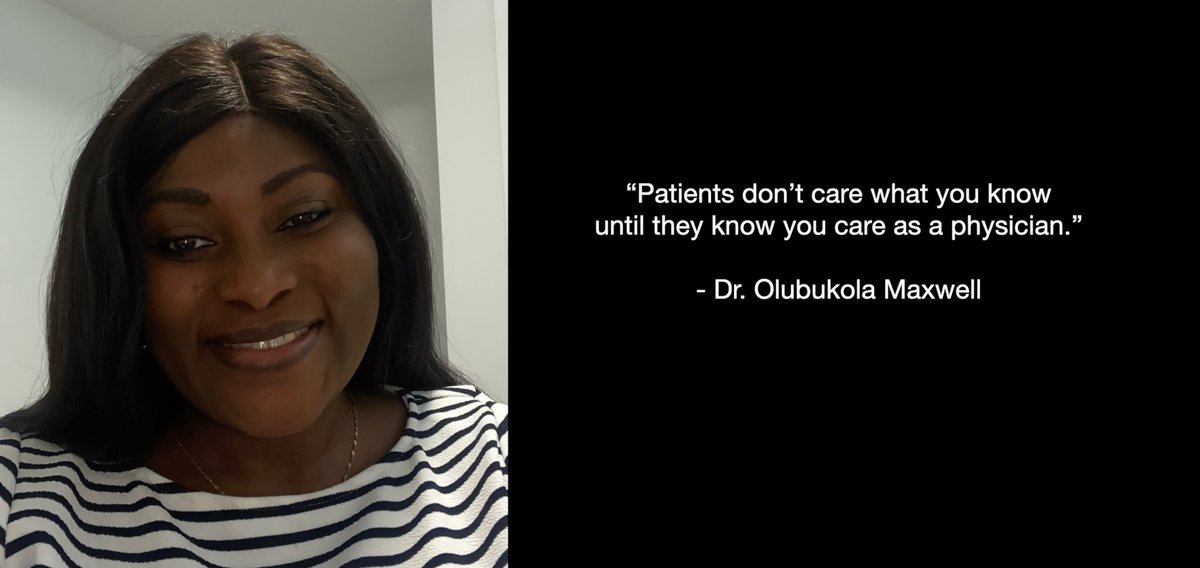Dr. Olubukola Maxwell strongly believes that prevention is key to a healthy community. As a family physician in Grande Prairie, she’s well positioned to help her patients focus on health promotion as part of their everyday lives.
The patient who nominated Dr. Maxwell certainly appreciates her:
“I believe my family doctor is the epitome of what a physician should be in Alberta. She is professional, yet empathetic. Knowledgeable, kind and compassionate. She takes the time to listen, and then she shares her wisdom and direction. She makes appropriate referrals, informing me of what to expect /next steps so I feel like a partner in my care.”
"What sets her apart aside from these excellent qualities is her accountability and devotion. She has personally called me after 8 p.m. at night on three separate occasions, following up on results after putting in a full day in clinic. I do not know how she sustains this level of service. I would so very much appreciate it if she could be recognized for her outstanding service.”

“On a personal note, she is the reason I have received early diagnosis and referral for treatment of breast cancer. She is changing and saving lives one patient at a time, for which I am eternally grateful.”
Let’s learn more about Dr. Maxwell’s approach to family medicine.
How long have you been practicing medicine?
It’s been 24 years. I trained in Nigeria, did my residency in the UK and came to Canada. I’ve been in Grande Prairie for 10 years.
Why did you choose to focus your practice on family medicine?
Although I did my initial residency partly in psychiatry, I was drawn to family medicine. Depending on your practice, you do have the unique opportunity to know your patients from cradle to grave and everything in between. And the better you know them, the more likely it is that you’ll notice something the patient may not even realize is an issue.
Primary care is cheaper comparatively, and I love that I could raise health awareness and focus on certain aspects of health advocacy one at a time. For example, primary care affords me the opportunity to reduce the potential health burden of cervical cancer by inculcating a project we refer to as SATPAP. SATPAP is an acronym for the Saturday Pap smear test we do offer to busy, eligible women and mothers in our clinic. Moms whose partners work and are busy during the week and who can only come in the evenings or weekends have found this really helpful, thereby improving our PAP uptake.
What do you find most satisfying about your work?
I enjoy the ability to become like an extension of the patient’s family. I try to develop a good rapport with each patient, educate and involve them as a team member in managing their own health. It’s a phenomenon we refer to as “power to patient” as a team at the clinic. It’s amazing how empowered patients go from “you are the doctor; you tell me” to asking more meaningful questions about their health goals, and one had better be prepared!
Patients don’t care what you know until they know you care as a physician. When patients become healthier, they are happy, and this is the beauty of this work. It makes it, for me, more of a passion than a chore.
How do you involve them?
I encourage patients to try and take short notes to ensure they can recall important points from our discussions. I joke and say to many of my patients that are capable at the beginning of our conversation that “I will try and forget all we will discuss, and you will try and remember and lead our follow-up conversation when you’re back in." It's quite interesting how this sparks unbelievable attention to health details and interest in the health matter at hand.
This, in my opinion, encourages clarification and seems to spark understanding and recall of the facts discussed. You see them taking careful notes too. This also helps them with health goal setting, makes them more aware of the numbers and targets we are trying to reach and encourages a mission to work towards them in between appointments and follow-up. It creates an ongoing, meaningful health conversation and seems to enhance patient-centred, collaborative decision making.
I also have a passion for mitigating against patient care falling through the cracks by encouraging patient participation as a valid team player within their own circle of care. Our team also adjusts our schedules by providing evening telephone consultations for follow-up, which creates more daytime appointments for our complex care patients.
How do you view primary care in your community?
Primary care, when well supported by policy makers and reinforced, motivates health care teams and patients. You’ll see health and health care bloom within the community. Health is wealth, and Grande Prairie is a thriving community. We offer opportunities to make it easier for patients to do the preventative care, which usually means less attendances at the emergency room/secondary and tertiary care service levels, which is patients’ preference really.
I’m lucky to have a wonderful group of patients, many of whom are quite motivated.
About Shine A Light
The Shine A Light Program recognizes and profiles AMA member physicians who are making a difference by:
- Spearheading projects that improve patient and/or community life.
- Diligently following/tracking patients to ensure coordinated care.
- Contributing to Alberta’s vision of a high-performing health care system.
